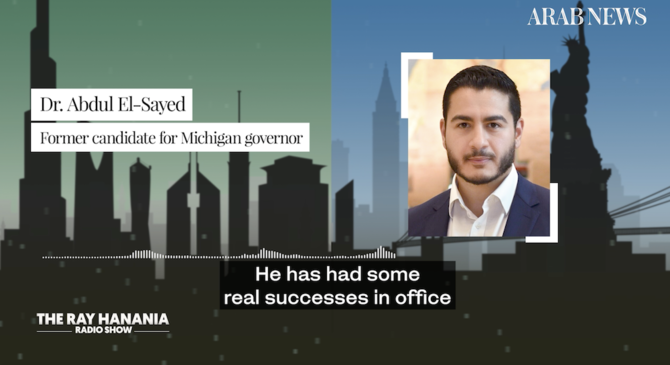CHICAGO: Former candidate for Michigan governor, Abdul El-Sayed, has defended US President Joe Biden, saying that Arab and Muslim Americans can’t simply focus their energies on criticism and must instead engage in positive focused activism, embrace consensus and achieve the policies they want.
El-Sayed ran for the Democratic nomination for Michigan governor in August 2018. Although he did not win, coming second with more than 30 percent, or 342,179 votes behind Gretchen Whitmer who became governor, El-Sayed was able to raise many important issues on behalf of the Arab and Muslim community.
During “The Ray Hanania Radio Show” on Wednesday, El-Sayed told Arab News that Arab and Muslim Americans must run for office but need to look beyond “differences that separate our (Arab and Muslim) communities” and focus instead on finding solutions rather than only expressing criticism.
“I think he is a good-hearted man whose intentions are in the right place. He has had some real successes in office and he has made some really courageous decisions for which he has suffered politically,” El-Sayed said.
“The decision to pull us out of Afghanistan, even though the pullout itself could have gone a lot better. The decision to finally pull us out of 20 years of war was an important decision and the courage in doing that should not be undermined. At the same time, I do think that his efforts and his intentions are one thing, and the politics, the political process, is another. I think sometimes we pay too much attention to the individual, the personality occupying the political power, and less to our role in shaping that. And so, if we want different policies out of the president, different policies out of the Congress, then the question we have to ask ourselves is what are we doing for it?“
El-Sayed added that the real question Arab and Muslim Americans must focus on is how they are leveraging power around that person to move their politics and move their policy.
“I have been to too many dinner parties where politics is discussed and the president is either praised or mocked, regardless of whom the president is. And then you ask, what are we doing to shape their policies and we act as if politics is something that happens in a glass house that we can’t actually engage with,” El-Sayed said.
“We see what’s happening inside but we can’t penetrate the walls. When actually, the privilege of growing up in a place like this and being and living in a place like this is that we can influence that and we have to. So, whatever you feel about the president’s politics whether abroad or here at home, the question we ought to be asking ourselves is what are we doing to shape those politics? If we want better health care, what are we doing to drive for it? If we want better access to affordable prescription drugs, what are we doing to get there?“
El-Sayed said the only way to be successful in American politics was to get involved, be open, and focus on the solutions not the disagreements that often divide the Arab and Muslim community in America.
A Democrat, El-Sayed also urged Americans not to simply focus on the negative aspects of politics, addressing growing concerns Arab-Americans and Muslims are having with President Joe Biden because of some inconsistencies in his approach to the Middle East and Arab World issues.
“I think sometimes we are more concerned with disagreeing with what someone said than finding the opportunities to agree and really promoting what we agree on. Part of it, it has gotten harder with the nature of our public conversation that has become so intermediated by social media, which promotes the disagreements rather than the places of agreement,” El-Sayed said.
“So, we tend to see a lot more of what we disagree with and that just enriches our disagreement rather than trying to find and preach what we agree on and hope that we can persuade people to come to see it our way, if not today then tomorrow. That implies that we are still listening. We are still talking. We are interacting with each other. But far too often, we find those points of disagreement and we use them as a pretext to end a conversation and then we find ourselves down on islands rather than working together to build a unified voice for the well-being of our particular community, for the well-being of our particular country, for the well-being of the world.”
Finding consensus and focusing on solutions rather than criticism was critical to political success, he said.
“There is always more that can be done. In the first place, I would say, let’s find the opportunities for agreement. What are those places where we all agree? What does that agreement look like? And how do we make that the framework for where we go moving forward?” El-Sayed said.
“The second thing I would say is that rather than concentrating on identities, let’s concentrate on the ideals that we bring to the table. It is important for us to come together as an Arab-American community. Personally, that is important to me as is my faith. And at the same time, both of those things come together with a certain level of ideals that they imprint upon me. The ideal of hospitality. The ideal of hope and inspiration. The ideal of justice. And let’s frame our engagement around those ideals.
El-Sayed said that it was easier for him to rise above tribal tendencies and engage the Arab community in a wider manner because he is Egyptian and there were so few Egyptian Americans in Michigan.
He believes that Arab Americans are still breaking through the barriers they brought with them from their original homelands when they came to America.
“A lot of our communities come from places where the opportunity to voice your positions or perspectives are muted at best and can wind you up in jail or worse. So, I think there is a real fear in engaging in the system. Sometimes that means people just stay quiet,” El-Sayed said. “Or it means that people engage in a politics of clientelism, meaning we have to find someone from outside of our community who is going to carry our interests. There are other interests they trumpet and those are going to be the ones they voice and we are just going to have to put up with it.”
A physician, epidemiologist, educator, author, speaker and podcast host, El-Sayed is also a commentator at CNN. His newsletter, The Incision, examines the trends shaping current debates. He is the author of three books, including “Healing Politics: A Doctor’s Journey into the Heart of Our Political Epidemic” (Abrams Press, 2020). He is a senior fellow at the FXB Center for Health & Human Rights at the Harvard TH Chan School of Public Health and a scholar-in-residence at Wayne State University and American University, where he teaches in the area of public health, public policy and politics.
El-Sayed has a bachelor degree in biology and political science from the University of Michigan (2007), a doctorate in philosophy in public health from the University of Oxford (2011), and a masters degree from the Columbia University College of Physicians and Surgeons (2014).
El-Sayed said that he was currently focused on his family and young child and is not thinking about running for office again, although he has not ruled it out in the future.
The Ray Hanania Show is broadcast live every Wednesday at 5 p.m. Eastern EST on WNZK AM 690 radio in Greater Detroit including parts of Ohio, and WDMV AM 700 radio in Washington DC including parts of Virginia and Maryland. The show is rebroadcast on Thursdays at 7 a.m. in Detroit on WNZK AM 690 and in Chicago at 12 noon on WNWI AM 1080.
You can listen to the radio show’s podcast by visiting ArabNews.com/rayradioshow.





















